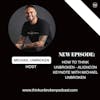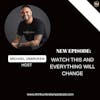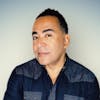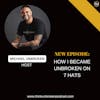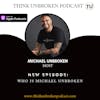E102 Taking a Mental Health Break to avoid a mental health breakdown | Mental Health Podcast
In this episode, I talk about why I just recently cleared my calendar, rescheduled my days, took a trip, and had a complete mental health break. Sometimes the best thing that we can do for ourselves is to hit the e-brake before we crash and burn.
For more information visit https://www.ThinkUnbrokenPodcast.com
In this episode, I talk about why I just recently cleared my calendar, rescheduled my days, took a trip, and had a complete mental health break. Sometimes the best thing that we can do for ourselves is to hit the e-brake before we crash and burn.
For more information visit https://www.ThinkUnbrokenPodcast.com
Support the Podcast: Become a listed sponsor!
Follow me on Instagram @MichaelUnbroken
Learn more about coaching at https://coaching.thinkunbroken.com
Get your FREE copy of my #1 Best-Selling Book Think Unbroken: https://book.thinkunbroken.com/
Hey! What's up, Unbroken Nation! Hope that you are doing well, wherever you are in the world today. I hope that you're having an amazing day. I know that I am, and the reason why is because I did something that I think we all need to do especially more frequently, and that is that I took a mental health break. My friends, let me tell you something that is so incredibly important, and even though it happens and we talked about it in society. I don't think people really leverage it enough and that is taking time for yourself, to take care of yourself.
I say to you all the time that you have to put yourself first, and that also applies to mental health that applies to these times where you're hitting the wall, where you're facing burnout, where you're going a hundred miles an hour, and you just gotta hit the pause button for a minute. Sometimes that pause buttons for an hour, sometimes, I pause buttons for three days, sometimes it's a week, sometimes it's longer. Ultimately, only you can figure that out, but in my journey, here's what I know about myself, I'm the kind of person that will typically work really, really hard for a very long period of time, and eventually, I had a wall and when I hit that wall, it's like straight burned-out, rock bottom, out of gas, can't get out of bed for three days, and that has happened in the past where I've worked, I've done something for, you know, months literally months at a time, with no break. And I was thinking recently, ‘Oh, I can feel it coming’ like if I don't take a break, I'm gonna hit that wall again, and part of that I understand is built into who I am natively as a human being, right? Think about the fact that, you know, from many trauma survivors and I would include myself in this, we often go to work and trying to build accomplishments, as this way to try to validate who we are, our experiences, or whatever it may be. And for me that's a very internal validation where I look at my accomplishments and ago great super proud of that, let's go to the next thing.
Well, one of the things that I understand about myself is and I think for people in general, you can't go to the next thing if you're not functional. And if you have burned yourself out to the point where you can't think straight, you can't get out of bed, you can't do any of the things you normally do, then you're already it's too late, right? The train has passed, you're playing with fire, you're in this position where it's you, it's going to be harder to recoup to go through the process of recuperation from a massive burnout, then it is to stop the train before you run out of gas, right? Probably not the best analogy in the world, but it's what comes to mind at the moment. I guess trains probably use fuel like coal, but either way, my point being this, the truth is we are often especially in this society we live in predicated to the idea that we have to work, really, really hard for very, very long time to feel accomplished. And I believe that to an extent where I think the conversation often does not take place is in, discussing the fact that to work a really, really long time for a really, in a really hard way, you stop to take care of yourself in that process.
And I think about this idea about mental health breaks, and I try to apply mental health breaks to my life, where I can, I will say this, I'm not perfect that it and I will never claim to be, but when I can, I try to preemptively strike against this idea by following my intuition and following my gut when it says you need a timeout, right? One of the things that we have to do is follow that gut and follow our intuition, despite the deadlines, despite the things on the calendar, despite the obligations, because the deeper down you go, the worse it's going to become, right? Think about this, if you are stepping down, into the depth of being over disposed of where you are just everywhere, all the time, all of your attention is going all over the place, and you hit a rock bottom, it's going to be a lot more difficult to bring yourself out of that, and I mean that rock bottom in this place of just mental exhaustion, maybe even physical exhaustion, right? And stepping into mitigating the risk of that happening by paying attention to the symptoms that, you know, that you have about the way you operate.
For me, I can go 6, 7 days a week, 12, 14, hour days every single day, for months at a time, which is on the telling of what I've just done. And then if I go past my threshold, which I felt was approaching, the comeback is really, really, really difficult if I get past that threshold and I get to this moment where I'm like; ‘Oh! Wow, actually, what's happening here?’ Here is, I can't even think straight. I can't function. I can't get out of bed. I don't want to do any of the things. And so I'm always thinking about mitigation of risk, you guys hear me talking about this all of the time. And so how do you mitigate the risk of hitting just complete exhaustion? That's by taking a mental health day. You go, look at the average calendar for someone who lives in America, or western state right now, and you will see Western Country, excuse me, and you will see the day of just stacked upon stacked, upon stacked, upon the stacked. One of the things that I have built in my calendar is my morning routine and we talk about this all the time and that part of my day is what sets me up for success, that’s to me is my space. And then throughout the course of the day, taking these very small microscopic, really mental health break swears, I will go and you know, I will do meditation for six minutes, seven minutes, when I can go outside, walk around the block, go stand in the sun for a minute, doing little incremental things like that to make it through the day, but you can only still do those things. I believed for so long on top of trying to accomplish all the things whether it's, you know, running a business or being a parent or you're being at your job, having all the back and forth of the zoom fatigue that we're all going through right now. And in that, you have to recognize something really important, and that is that you have to listen to yourself and you're never going to steer yourself wrong.
If you really listen to your intuition, if you really follow your gut and trust that you're making the right decision for yourself, you will always make the right decision for yourself and that means calling into work and saying I need a day or two or four or even a week if that's what you need, taking the event off of the calendar, even though it's been on there for seven months, saying no to the dinner, not going to the park because the kids want to like whatever that thing is and having that time in that space in your life to recuperate because if you go past and again, this is just a thesis that I have kind of found founded on my own experiences, but if you go past that threshold called the threshold of acceptability, if you want to call it that of knowing what you're capable of doing with your mental and physical health. Then I believe that coming back takes you five or six times longer than just taking a couple days away or a couple of hours even.
And so all this is to say this, one of the things that I want you to think about even today, even right now in this moment is, do you need a mental health day? Do you need a day that is all about you where you call in sick to work, right? Maybe call in sick to work is not the right way to phrase it, but we're you remove yourself from the office, get all the zoom meetings, off the calendar, say no to all the things that don't need your attention and just chill, like think about this. I want you to really think about this from it. “When's the last time you just did nothing, except what you needed to do to take care of yourself and laid on the couch and read a book and got a massage or went to the spa or the salon or you'll went to your favorite restaurant alone, right?” Doing the things that you need to, maybe it's walking in the park, maybe it's going on a hike, maybe it's, you know, hopping on a plane and going somewhere and exploring, that my jam, I love to go explore. And so, you know, that's the thing as where you are in your life. You always are going need to have a breakthrough that may be a break from therapy, that may be a break from coaching, that may be a break from the self-help stuff, there's always space for the mental health break.
So the question I want you to ask yourself today is what do I need to do to take care of my mental health today? Because sometimes it's not therapy and that's not going to the gym and it's not deep diving in a self-help book. Sometimes it's nothing. So I'm always asking myself. Am I putting myself first? And when it comes to this, the way that we work, the way that we act, the way that we take care of our mental health has to be a non-negotiable. Listen to yourself, trust your instincts, take the break when you need to take it, Unbroken Nation, TAKE A BREAK
All right, my friends have an amazing day.
Please as usual like, subscribe, comment, share, leave a review on iTunes, please.
And until next time.
My friends, Be Unbroken.
I'll see you.
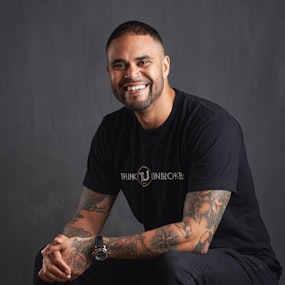
Michael Unbroken
Coach
Michael is an entrepreneur, best-selling author, speaker, coach, and advocate for adult survivors of childhood trauma.
Welcome to The Think Unbroken Podcast!
Here are some of my favorite recent guests!



























